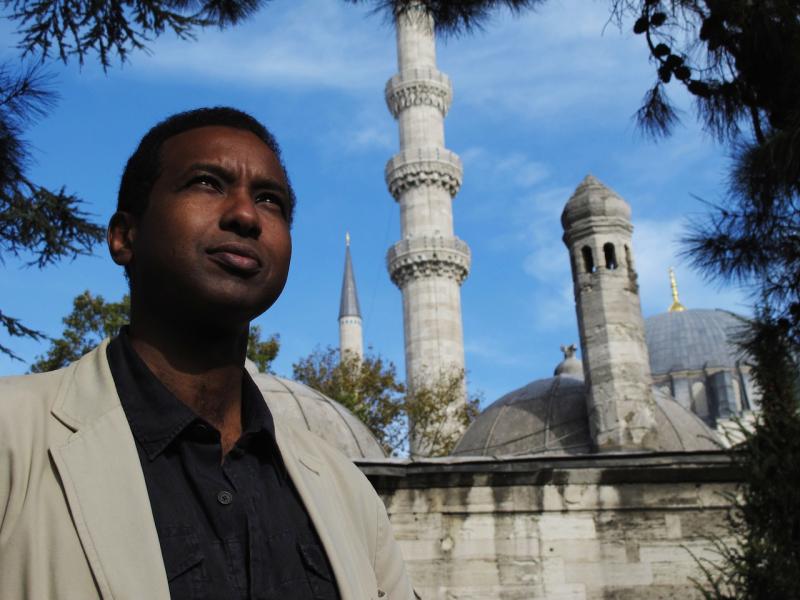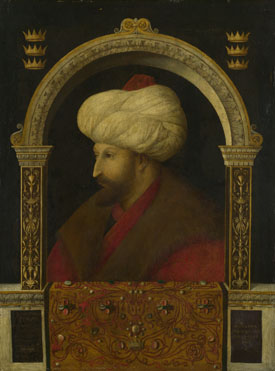The Ottomans: Europe's Muslim Emperors, BBC Two | reviews, news & interviews
The Ottomans: Europe's Muslim Emperors, BBC Two
The Ottomans: Europe's Muslim Emperors, BBC Two
A fascinating documentary series examining the history of the former Turkish empire

School kids today could probably tell you a thing or two about mummies in ancient Egypt, Romans and how they built straight roads and aqueducts, and possibly, at a stretch, even a few things about the British Empire. But the Ottoman Empire? Name me a sultan.
Could one reason be that the Turks themselves have done much to forget their Ottoman past? A Westernised secular republic since 1923, they spent the first half of the 20th century trying to redress their reputation as the “sick man of Europe”, and the other attempting to join the EU. For the past decade they’ve had a moderate Islamic government, and only now, suggests Rageh Omaar in this intelligent and utterly fascinating three-part series on the rise and fall of the Ottoman Empire, have Turks allowed themselves to look further back than the founding of the modern Turkish state. A popular television drama set during the golden age of the Ottomans is currently holding audiences riveted, perhaps allowing them to forget the current political tensions under Prime Minister Erdoğan and escape into a gloriously romanticised past. And perhaps they’re as seduced by the exoticism of the harems of Topkapi Palace as 19th-century Orientalists in the west once were.
Enslaved and made to convert to Islam they were taken to the sultan’s harem as concubines to produce his heirs
Omaar likened the Ottoman Empire at its height to that of Rome in its vast reach and power. And it was at least as splendid in its riches, revitalising the Byzantine centre of the crumbling Christian empire when it seized Constantinople in 1453. The conquest itself was an astonishing feat of ingenuity involving sheer might and manpower. It ended 1000 years of Christian rule in just 54 days – we learnt that Mehmet II had his men lift their boats out of the waters of the Bosphorus and carry them on planks to the walls of the city. (Pictured below: Portrait of Sultan Mehmet II, 1480, attributed to Gentile Bellini; National Gallery, London.)
 To help rebuild the city (the names Konstantinye and Islambol, the latter to denote the Islamisation of the city, were in fact used interchangeably in official documents throughout the Ottoman years), there was a system of favourable taxes and financial inducements. However, the new empire didn’t shy away from strong-arm tactics: groups of craftsmen from the provinces were forced by edict and threat to move to the city and apply their skills where they were needed most. And there was little concern for either religious or ethnic difference, for the success of the empire came first: Jews and Christians were not barred from setting up businesses, although Jews still had to pay higher taxes in order to do so. But compared to Christian Europe it certainly treated its Jewish minorities with more tolerance, and they could and did rise to positions of political influence within the Sultanate, although these latter achievements weren't greatly explored in the programme. The practice of devşirme, however, was.
To help rebuild the city (the names Konstantinye and Islambol, the latter to denote the Islamisation of the city, were in fact used interchangeably in official documents throughout the Ottoman years), there was a system of favourable taxes and financial inducements. However, the new empire didn’t shy away from strong-arm tactics: groups of craftsmen from the provinces were forced by edict and threat to move to the city and apply their skills where they were needed most. And there was little concern for either religious or ethnic difference, for the success of the empire came first: Jews and Christians were not barred from setting up businesses, although Jews still had to pay higher taxes in order to do so. But compared to Christian Europe it certainly treated its Jewish minorities with more tolerance, and they could and did rise to positions of political influence within the Sultanate, although these latter achievements weren't greatly explored in the programme. The practice of devşirme, however, was.
This was the practice whereby boys were taken from Christian families (though never two boys from the same family and never if there was just one boy), made to convert to Islam and prepared for a life in the service of the state. Though the practice was inevitably locally resented, it was also acknowledged that many families actually welcomed it, since the boys had every opportunity to rise to positions of great military or political power, even to that of grand vizier, the highest minister of state with absolute power of attorney. One academic even produced the astonishing fact that out of a total of 45 grand viziers of the 600-year existence of the empire, only three or four of them were ethnically Turkish.
What happened to many Christian girls was rather more predictable. Enslaved and made to convert to Islam (though one such slave did, unusually, end up marrying her master, Suleiman the Magnificent), they were taken to the sultan’s harem as concubines to produce his heirs. This was politically strategic, since the concubines were rootless and isolated and this minimised the risk of in-laws manoeuvring for power.
The programme was full of fascinating facts and was utterly compelling. We were reminded by one academic (there was an array of expert talking heads) that if you don’t understand the Ottomans then you can’t begin to understand the modern transformations of the Balkans and the Middle East; and without slowing the pace of the riveting main story these connections were made throughout. One small quibble was the use of blasts of bombastic music to ratchet up tension (why can’t documentary-makers show some acoustic restraint? It would be far more effective), but this is a series that will do much to educate and enlighten.
Add comment
The future of Arts Journalism
You can stop theartsdesk.com closing!
We urgently need financing to survive. Our fundraising drive has thus far raised £49,000 but we need to reach £100,000 or we will be forced to close. Please contribute here: https://gofund.me/c3f6033d
And if you can forward this information to anyone who might assist, we’d be grateful.

Subscribe to theartsdesk.com
Thank you for continuing to read our work on theartsdesk.com. For unlimited access to every article in its entirety, including our archive of more than 15,000 pieces, we're asking for £5 per month or £40 per year. We feel it's a very good deal, and hope you do too.
To take a subscription now simply click here.
And if you're looking for that extra gift for a friend or family member, why not treat them to a theartsdesk.com gift subscription?
more TV
 Mr Scorsese, Apple TV review - perfectly pitched documentary series with fascinating insights
Rebecca Miller musters a stellar roster of articulate talking heads for this thorough portrait
Mr Scorsese, Apple TV review - perfectly pitched documentary series with fascinating insights
Rebecca Miller musters a stellar roster of articulate talking heads for this thorough portrait
 Down Cemetery Road, Apple TV review - wit, grit and a twisty plot, plus Emma Thompson on top form
Mick Herron's female private investigator gets a stellar adaptation
Down Cemetery Road, Apple TV review - wit, grit and a twisty plot, plus Emma Thompson on top form
Mick Herron's female private investigator gets a stellar adaptation
 theartsdesk Q&A: director Stefano Sollima on the relevance of true crime story 'The Monster of Florence'
The director of hit TV series 'Gomorrah' examines another dark dimension of Italian culture
theartsdesk Q&A: director Stefano Sollima on the relevance of true crime story 'The Monster of Florence'
The director of hit TV series 'Gomorrah' examines another dark dimension of Italian culture
 The Monster of Florence, Netflix review - dramatisation of notorious Italian serial killer mystery
Director Stefano Sollima's four-parter makes gruelling viewing
The Monster of Florence, Netflix review - dramatisation of notorious Italian serial killer mystery
Director Stefano Sollima's four-parter makes gruelling viewing
 The Diplomat, Season 3, Netflix review - Ambassador Kate Wyler becomes America's Second Lady
Soapy transatlantic political drama keeps the Special Relationship alive
The Diplomat, Season 3, Netflix review - Ambassador Kate Wyler becomes America's Second Lady
Soapy transatlantic political drama keeps the Special Relationship alive
 The Perfect Neighbor, Netflix review - Florida found-footage documentary is a harrowing watch
Sundance winner chronicles a death that should have been prevented
The Perfect Neighbor, Netflix review - Florida found-footage documentary is a harrowing watch
Sundance winner chronicles a death that should have been prevented
 Murder Before Evensong, Acorn TV review - death comes to the picturesque village of Champton
The Rev Richard Coles's sleuthing cleric hits the screen
Murder Before Evensong, Acorn TV review - death comes to the picturesque village of Champton
The Rev Richard Coles's sleuthing cleric hits the screen
 Black Rabbit, Netflix review - grime and punishment in New York City
Jude Law and Jason Bateman tread the thin line between love and hate
Black Rabbit, Netflix review - grime and punishment in New York City
Jude Law and Jason Bateman tread the thin line between love and hate
 The Hack, ITV review - plodding anatomy of twin UK scandals
Jack Thorne's skill can't disguise the bagginess of his double-headed material
The Hack, ITV review - plodding anatomy of twin UK scandals
Jack Thorne's skill can't disguise the bagginess of his double-headed material
 Slow Horses, Series 5, Apple TV+ review - terror, trauma and impeccable comic timing
Jackson Lamb's band of MI5 misfits continues to fascinate and amuse
Slow Horses, Series 5, Apple TV+ review - terror, trauma and impeccable comic timing
Jackson Lamb's band of MI5 misfits continues to fascinate and amuse
 Coldwater, ITV1 review - horror and black comedy in the Highlands
Superb cast lights up David Ireland's cunning thriller
Coldwater, ITV1 review - horror and black comedy in the Highlands
Superb cast lights up David Ireland's cunning thriller
 Blu-ray: The Sweeney - Series One
Influential and entertaining 1970s police drama, handsomely restored
Blu-ray: The Sweeney - Series One
Influential and entertaining 1970s police drama, handsomely restored

Comments
"...though never two boys
I have found this programme
In the end I struggled to